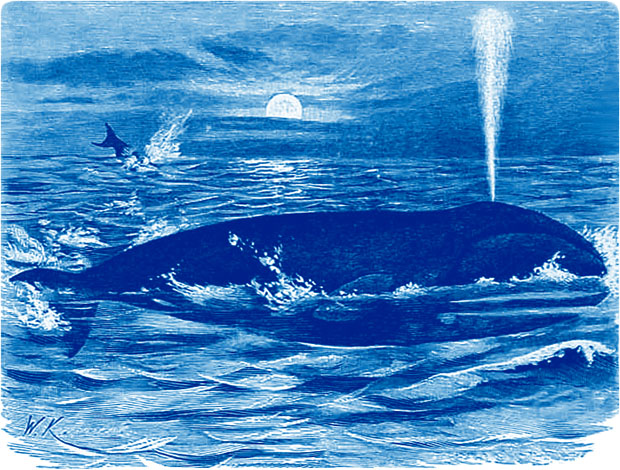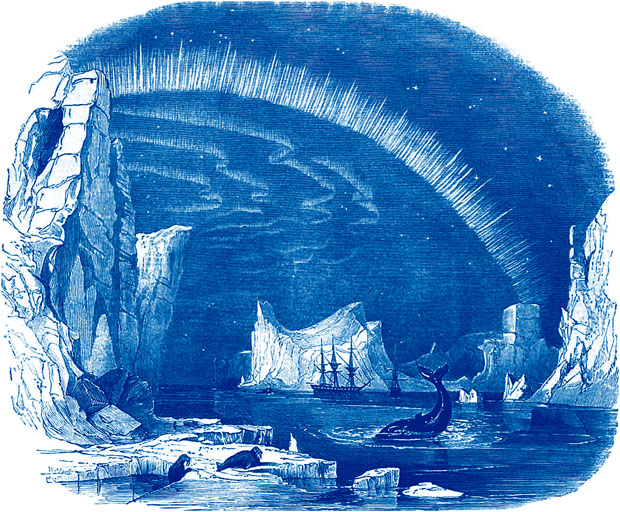|
|
 |
| My Favourite Planet > Blogs > Edwin Drood's Column > August 2010 |
 |
 |
back |
Edwin Drood's Column |
 |
31 August 2010 |
 |
| |
 |
 |
| Presenting marine mammals: the day job |
In which Edwin, having survived the great creationist flood and the BP platform disaster,
and encouraged in this direction by possibly the wettest August on record, goes in search
of our cetacean cousins and questions whether they might not also be better off on land.
 |
It has now rained for forty days and forty nights so I feel the appropriate time has come:
ladies and gentlemen, today I give you the whale.
 Wonderful creature, beautiful, sleek, intelligent, social, musical (well, sort of) cheap to run (440 miles on a mouthful of plankton) and albeit a mammal to boot. Why is the whale a mammal and not a fish, after all, it lives in the ocean, n’est-ce-pas? The straight-up answer is that whales have a big problem chewing, so they prefer to inhale their food and there’s nothing more uncomfortable than a gill-full of krill, so our large cousins decided to stay with the viviparous placentals and take their chances at a lungful of air every few minutes. The highest citation you could award a cetacean would be for humility (unless you prefer to call it bullying), because as the world’s biggest creatures they prey on its smallest food, whose extreme abundance has assured their success for many thousands of years. This is, of course, an example of post hoc ergo propter hoc logic and creationists would welcome me with outstretched arms.
 But why, you might ask, didn’t they leave the oceans with the other mammals? Well, it may be that they saw how we treat the others and decided to stay where they are. Cousin gorilla gets caught up in a civil war and chokes on shrapnel. Cousin horse is forced to run the Grand National and is then turned into dog food. Cousin sheep gets spiced up and served on a kebab. Cousin pig becomes intimately associated with eggs at breakfast and baguettes at lunch. No one will let cousin tiger hang around the jungle all day in his pyjamas doing nothing ... he’s expected to cure all the impotence in China, and cousin cow is either deified (enough to make anyone’s horns curl) or reduced to burgers, T-bones and upholstery in the new XJ. Staying in the oceans was a no-brainer before Captain Ahab came along. |
| “Full fathom five thy father lies ... * |
Plus there’s this: whales are naturally to be found in very deep water, where predators such as us don’t generally go. Sperm whales have been documented as deep as 2500 metres at which depth whatever air they still have left to their 60 minute breathing capacity (it takes them about twenty minutes just to get down there) is as compressed as a diamond at pressures in the 100s of atmospheres. All this air (for the blue whale it may be as much as 5000 litres) is quickly broken down for storage to keep dangerous CO² and Nitrogen from either poisoning the bloodstream (CO²) or causing the “bends” (N²) so dreaded by divers. The oxygen is mainly stored in the muscles (whale muscle is massively more efficient at this than we surface creatures), as their lungs gradually collapse during diving along with their flexible rib-cage. And herein lies the first of many whale paradoxes (if it’s Drood, you know there’s going to be a paradox somewhere): whales are built super soft and squishy, because their environment is super harsh and relentless. Unlike the human approach to extreme diving (involving bells and bathyscaphes and all that Jules Vernian paraphernalia), where large additions of reinforcement in the toughest metals are required for every 10 metres, the whale simply gives in to the ambient pressure and gets happily crushed down to a fraction of its volume. So the size of a whale will depend very much on exactly where it is when measured.
 This ability to breathe surface air, rather than extracting oxygen from water as fish do, also enables the whale and other sea-mammals to achieve great size and strength while maintaining the capacity to operate over a wide range of depths and temperatures, thus increasing their hunting prospects considerably. Fish are generally more restricted in this, the difficulty of processing oxygen limits their muscle growth and questions of optimum temperature, pressure and density tie them closer to more limited habitats. Yet, and here it gets paradoxical again, this mammalian advantage is also the whale’s greatest weakness. They have to come to the surface, unlike nuclear submarines with their chemical gills and salt-water batteries, where they make obvious targets of themselves. To further aggravate this, preparation for deep diving, where whales mostly do their feeding, involves several short dives to help store oxygen in the muscles. This means that they first have to blow out a lot of water and then take several gigantic “gulps” of air interspersed with short dives. All this activity has them breaking the surface about a dozen times: highly conspicuous. But having hardly any natural predators, this was all very fine until, as I mentioned before, Captain Ahab showed up. |
| ... Of his bones are coral made... ** |
Human activity has reduced overall whale numbers to a tiny percentage (for some especially “sushi-friendly” species, as low as 0.15%) of their original populations. And since the Japanese, and now the Chinese and Koreans too, like to contract-buy their whale meat (and penguin meat, by the way) in “futures” and care not a midget’s widget for international covenants (the Japanese say that eating whale is a “cultural expression”), then it will only be a matter of a few short decades before there are no more sea mammals at all. There will be only the bleached bones in museum collections and that towering whale-skull gate at Lewis harbour to tell us how huge they really were. But that won’t matter to us, as at about this point we will all die from oxygen depletion. You see, these great beasts are all that stops the rapid increase of the kind of super-prolific micro-organisms that produce massive amounts of CO² and absorb massive amounts of oxygen. Result, dead seas everywhere: and dead seas mean dead land after a very short while. Our tiny surface area cannot absorb sufficient CO² to compensate, particularly as our priority seems to be to destroy such capacity to absorb, rather than to augment it. This is odd behaviour, but then, we’re an odd lot, aren’t we now?
 And yet somehow they find us irresistible, our marine cousins. Not content with their day job of sweeping the oceans at extreme depths, they seek us out as swimming partners for their leisure hours, try to impress us with their singing, mate rather unsuccessfully with our deepwater yachts and some of them (the dolphin family) turn up not only in Tuna tins, but also on T-shirts at summer camps, are seen dancing along the water’s edge at Knokke in Belgium (of all places), or even pretend to the throne of France. It’s hard not to be impressed by all this. One can’t help thinking they deserve a better deal. They certainly try to please us and we certainly do nothing whatsoever to please them. It’s a strangely lopsided relationship to say the least: “Look, I can do tricks” – “Look, I can turn you into machine oil.” “Look, I saved you from drowning” – “Look, I killed your mummy and put you in a theme park.” “Look how graceful and smart I am?” – “Look how gratuitously violent and dumb I am!” “I’m going to put you on my FishBook list of friendly species” – “I’m going to put you in formaldehyde.” Even if our giant cousins had left the oceans with the others, they would by now look a lot like very fat, short-legged versions of the Obama’s dog and be living in large numbers in the relative security of our forests and fields, waiting to be culled for four-star Restaurants in Mayfair and crying their plaintiff cries for visiting tourists: “Look, darling, a pod of Right Whales just slithering down the valley over there!” And with a bit of luck there wouldn’t be any in Japan or Iceland at all, so they’d have to make do with holiday snaps or the occasional can of smoked Humpback-with-cranberries from the deli, like everybody else. |
| .... Those are pearls that were his eyes” *** |
But maybe the whales and dolphins will get the better of us in the end: they can outwait us, they have the vast resources of the deep oceans at their disposal, much of which are unknown to us and, if the “dolphin-ologists” and animal behaviourists are right, they’re much cleverer than us anyway (which isn’t really much of a big deal). Using all that lost Spanish and Nazi gold they’ve been discretely amassing for years and a Sultan’s ransom in pearls, they may create some ultimate behemoth in their lab in the Mariana Trench which, like Kipling’s “Small Porgies” will emerge from the depths to politely devour us all: “Oops, dreadfully sorry, seem to have inhaled the Coldstream Guards, the Royal Greenjackets and rather a lot of Swindon by mistake.” Or perhaps there’ll even be some eleventh hour rapprochement as the fate of humanity hangs in the balance, threatened by who knows which falling asteroid or invading death-star. I can just picture it: we’ve cracked the code. Eager scientists await the great cross-species breakthrough. Cetacean intelligence is going to save the planet. It’s nail biting stuff. Finally a tinny voice emerges from the static of the language converter: “OK, you vertical worm, do you read me? Yes, you with the clipboard, I’m talking to you. Now listen up good, you flotsam: the square on the hypotenuse is equal to the sum of the squares on the other two sides. Quod Erat bloody Demonstrandum! ... Hey, did you get that? Your move, pinhead!”
© Edwin Drood 31 August 2010
PS: *** For those who don’t know their Caliban from their Taliban,
the quotes are from Shakespeare’s The Tempest
Full fathom five thy father lies; Of his bones are coral made; Those are pearls that were his eyes; Nothing of him that doth fade But doth suffer a sea-change Into something rich and strange.
Sea-nymphs hourly ring his knell: [Burden: Ding-dong.] Hark! now I hear them-Ding-dong bell.
 Ariel's Song, "The Tempest" by William Shakespeare, Act 1, Scene 2.
Full text of the play at Project Gutenberg:
 www.gutenberg.org/dirs/etext97/1ws4110.txt
www.gutenberg.org/dirs/etext97/1ws4110.txt
Illustration, top: Greenland whale. Illustration from The Royal Natural History,
Volume 3, edited by Richard Lydekker, 1894-95. |
|
| |


A whale, walruses, icebergs and ships in the Arctic, illuminated by the Aurora Borealis.

Illustration from The Illustrated London News, 13 October, 1849. |
Edwin Drood's Column, the blog by The Mysterious Edwin Drood,

at My Favourite Planet Blogs.
We welcome all considerate responses to this article
and all other blogs on My Favourite Planet.
Please get in contact. |
 |
Visit the My Favourite Planet Group on Facebook.

Join the group, write a message or comment,
post photos and videos, start a discussion... |
|
Views of blog authors do not necessarily reflect those of the publishers
or anyone else at, on or in the vicinity of My Favourite Planet. |
 |
 |
|
|
| |
| |
|
| |
 |
| |
 |
| |
 |
| |

George Alvanos

rooms
in Kavala's historic Panagia District

Anthemiou 35,
Kavala, Greece

kavalarooms.gr
 |
| |

Olive Garden Restaurant

Kastellorizo, Greece

+30 22460 49 109

kastellorizo.de
 |
| |

Papoutsis
Travel Agency

Kastellorizo, Greece

+30 22460 49 286

greeklodgings.gr
 |
| |
|